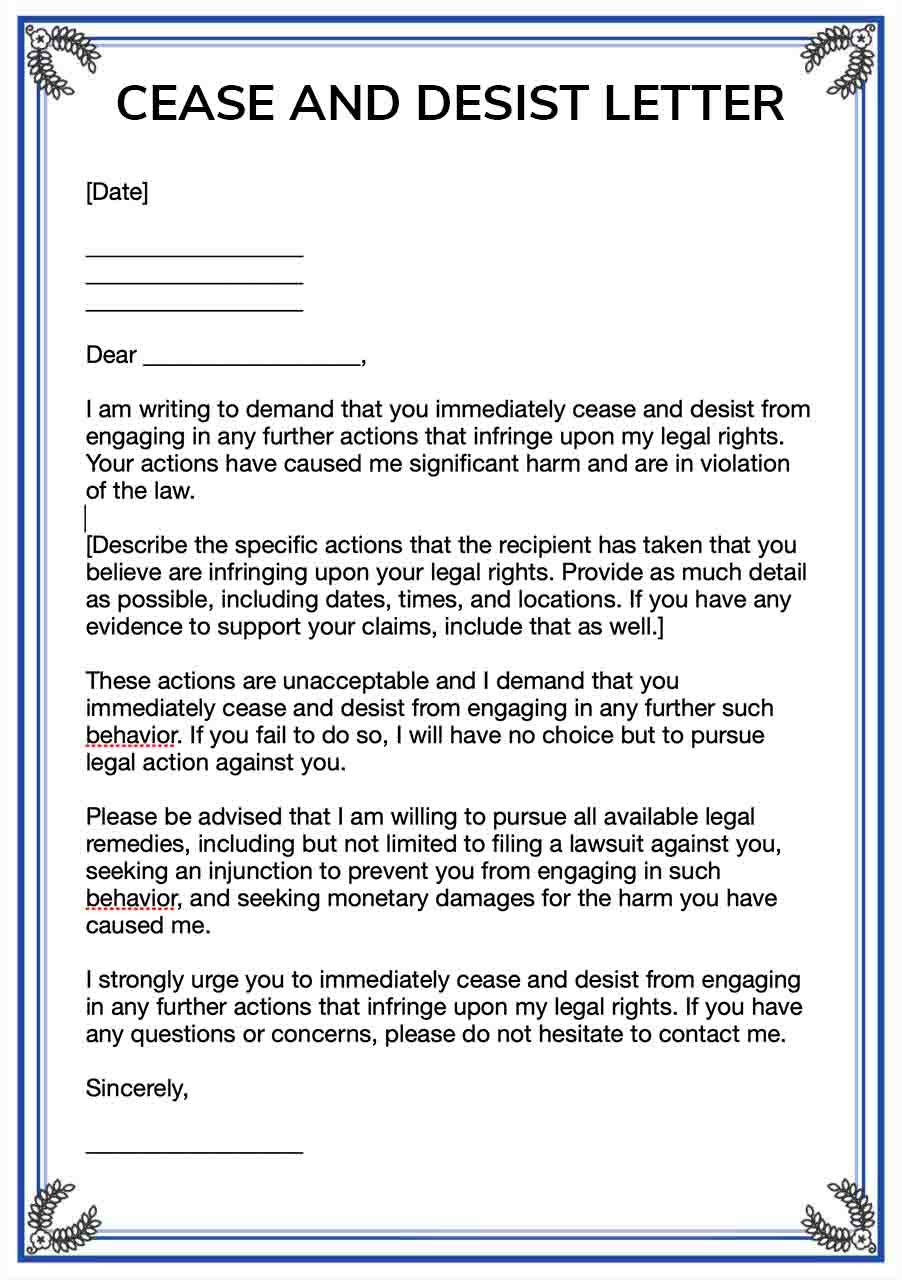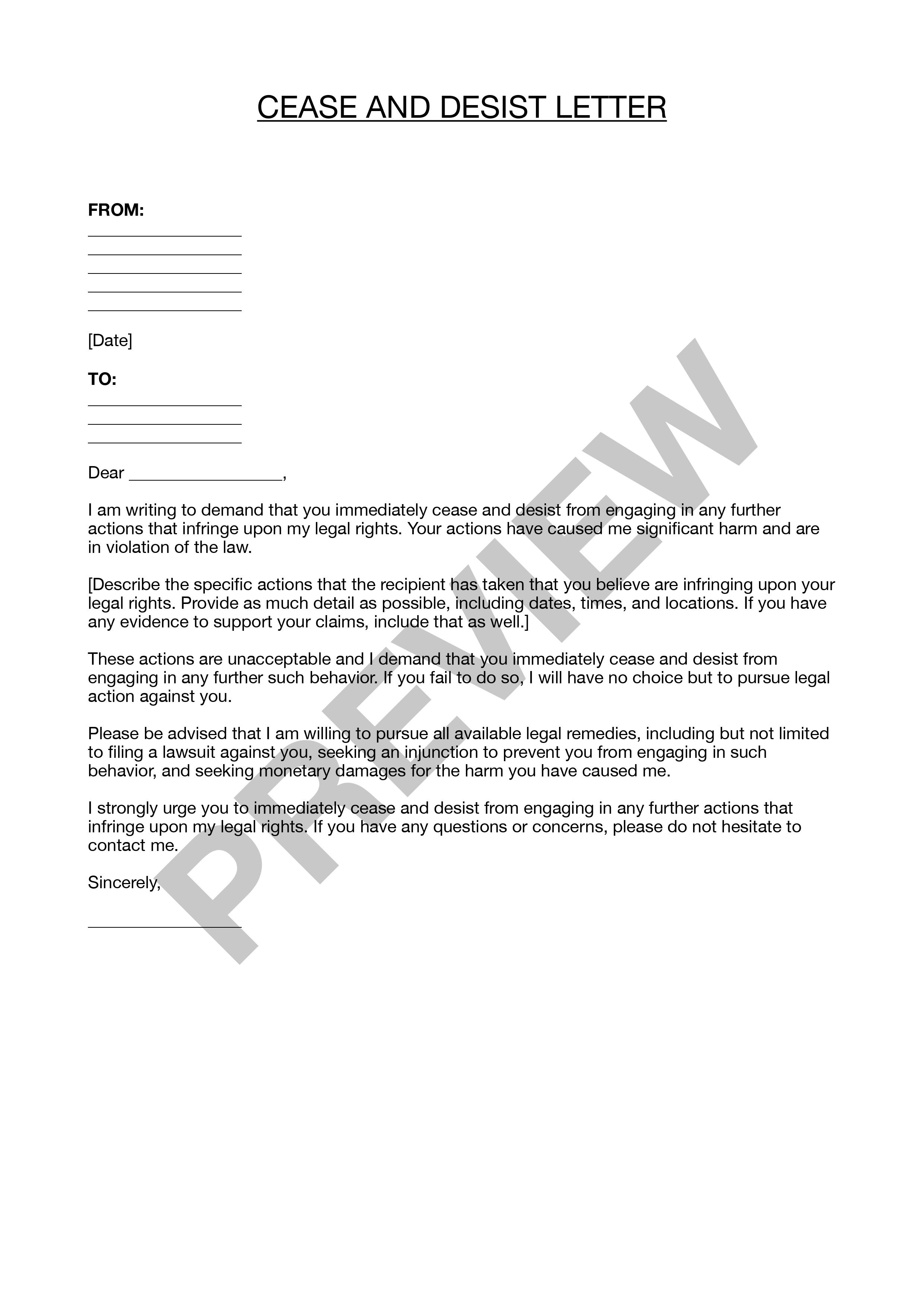Generate Cease and Desist Letter
A Cease and Desist Letter is a legal demand to stop harmful or illegal activity.
What is the reason for the Cease and Desist?
Select one option belowLast Updated April 2023
What is a Cease and Desist Letter?
A cease and desist letter is a written communication sent by an individual or entity to demand that another individual or entity stop engaging in a certain activity or behavior that is deemed to be illegal or harmful.
These letters are typically used to address instances of harassment, trademark infringement, copyright violation, or any other behavior that is causing harm or damages. A cease and desist letter usually includes a detailed description of the offending behavior, a demand that it be stopped immediately, and a warning that legal action will be taken if the behavior continues.
A cease and desist letter is not a legally binding document, but it is often used as a first step in initiating legal proceedings, as it puts the recipient on notice that their behavior is unacceptable and can lead to legal consequences.
Types of Cease and Desist Letters
There are different types of cease and desist letters that can be used depending on the specific situation and the legal framework of the relevant jurisdiction. Here are some common types of cease and desist letters:
-
Trademark infringement cease and desist letter: This type of letter is used to demand that an individual or entity stops using a trademark that is identical or confusingly similar to another party's registered trademark.
-
Copyright infringement cease and desist letter: This type of letter is used to demand that an individual or entity stops using copyrighted material without permission or license.
-
Harassment cease and desist letter: This type of letter is used to demand that an individual or entity stops engaging in behavior that constitutes harassment, such as stalking, threats, or unwanted contact.
-
Defamation cease and desist letter: This type of letter is used to demand that an individual or entity stops making false statements or spreading rumors that harm the reputation of another person or entity.
-
Debt collection cease and desist letter: This type of letter is used to demand that a debt collector stops contacting a debtor, as per the provisions of the Fair Debt Collection Practices Act.
-
Nuisance cease and desist letter: This type of letter is used to demand that an individual or entity stops engaging in activities that are causing harm or nuisance to another party, such as excessive noise, pollution, or trespassing.
It's important to note that the specific content and requirements of a cease and desist letter may vary depending on the situation and jurisdiction, and it's usually advisable to seek legal advice before sending one.
How do I create a Cease and Desist Letter?
Here are some general steps to follow when creating a Cease and Desist Letter with Documentify:
-
Identify the offending behavior: Clearly identify the behavior that you want the recipient to stop.
-
State your demand: Clearly state your demand that the recipient stop the offending behavior immediately.
-
Provide evidence: Provide any evidence or documentation that supports your claim.
-
Explain the consequences: Explain the consequences of not complying with your demand, such as legal action or financial damages.
-
Include a deadline: Include a deadline for the recipient to respond or comply with your demand.
-
Consider seeking legal advice: Consider seeking legal advice to ensure that your Cease and Desist Letter is effective and legally compliant.
-
Deliver the letter: Deliver the letter to the recipient via certified mail with a return receipt requested or through another verifiable method.
Who can send a Cease and Desist letter?
A Cease and Desist letter can be sent by anyone who has a legal basis to request that someone stop engaging in a particular activity. This can include individuals, businesses, organizations, and government agencies. Some common reasons for sending a Cease and Desist letter include:
- Copyright or trademark infringement: If someone is using your copyrighted or trademarked material without your permission, you may send a Cease and Desist letter to request that they stop.
- Harassment or stalking: If you are being harassed or stalked, you may send a Cease and Desist letter to demand that the person stop contacting you.
- Defamation: If someone is making false or defamatory statements about you, you may send a Cease and Desist letter to demand that they stop.
- Breach of contract: If someone is violating the terms of a contract you have with them, you may send a Cease and Desist letter to demand that they comply with the contract.
It's important to note that Cease and Desist letters should only be sent when there is a valid legal basis for doing so. Sending a letter that is frivolous or without merit can result in legal consequences, such as a countersuit for harassment.
Frequently Asked Questions
The purpose of a Cease and Desist letter is to formally request that someone stop engaging in a specific activity that is either illegal or infringing on the sender's rights. These activities can include harassment, defamation, copyright infringement, trademark infringement, or other forms of illegal or unauthorized behavior. The letter typically outlines the offending behavior, demands that it be stopped, and may threaten legal action if the behavior does not stop. The ultimate goal of a Cease and Desist letter is to resolve the issue without having to go to court, but it can also be used as evidence if legal action is pursued.
Technically, a Cease and Desist letter can be ignored, but doing so can have legal consequences. Ignoring a Cease and Desist letter could result in the sender pursuing legal action against you, such as filing a lawsuit or seeking an injunction. If the sender is successful in court, you could be ordered to pay damages or face other penalties.
It's important to note that ignoring a Cease and Desist letter does not make the underlying issue go away. If you believe that the claims in the letter are unfounded or inaccurate, it's important to respond in a professional manner and address the specific allegations being made against you. If you do not respond, the sender may assume that you are unwilling to resolve the issue and may pursue legal action.
Even if you believe the claims in the letter are without merit, it's often a good idea to seek legal advice to determine the best course of action. An attorney can help you assess the validity of the claims and advise you on the best way to respond to the letter.
If you receive a Cease and Desist letter, it's important to take it seriously and respond appropriately. Here are some steps you can take to respond to a Cease and Desist letter:
-
Read the letter carefully and make sure you understand the allegations being made against you.
-
Consider seeking legal advice from an attorney who specializes in the relevant area of law. They can help you assess the validity of the claims being made in the letter and determine the best course of action.
-
If you believe the claims in the letter are valid, you may want to comply with the demands and stop the activity that is being challenged.
-
If you believe the claims in the letter are unfounded or inaccurate, you may want to respond to the letter and explain your position. Your response should be polite, professional, and factual, and should address the specific allegations being made against you.
-
If you do respond, make sure you keep copies of all correspondence, and consider sending your response by certified mail or other means that provide proof of delivery.
-
If you receive a Cease and Desist letter that threatens legal action, you should take it seriously and consult with an attorney as soon as possible.
A Cease and Desist letter is typically sent when one party believes that another party is engaging in activities that violate their legal rights, such as using their intellectual property without permission, making false or misleading statements about them, or engaging in harassment or defamation. Here are some specific situations where a Cease and Desist letter may be appropriate:
-
Intellectual property infringement: If someone is using your trademark, copyright, or patent without your permission, you may send a Cease and Desist letter to demand that they stop using your intellectual property.
-
Defamation: If someone is making false or defamatory statements about you or your business, you may send a Cease and Desist letter to demand that they retract the statements and refrain from making further defamatory statements.
-
Harassment: If someone is engaging in harassing behavior, such as stalking or threatening you or your family members, you may send a Cease and Desist letter to demand that they stop the behavior.
-
Contract disputes: If someone is violating the terms of a contract, such as by failing to pay for services rendered or failing to deliver goods as agreed, you may send a Cease and Desist letter to demand that they comply with the terms of the contract.
It's important to note that sending a Cease and Desist letter should not be taken lightly, as it can have legal consequences. If you are considering sending a Cease and Desist letter, it's often a good idea to consult with an attorney first to ensure that your legal rights are protected and that the letter is drafted properly.
A Cease-and-Desist Order is a legal order issued by a government agency, court, or regulatory body that requires an individual or organization to stop engaging in certain activities that are deemed unlawful or harmful. It is similar to a Cease and Desist letter, but carries the weight of a legal order.
A Cease-and-Desist Order is typically issued after an investigation has been conducted, and the agency or court has determined that the individual or organization in question has violated the law. The order may require the party to immediately stop the unlawful activity and may also impose fines or other penalties for noncompliance.
A Cease-and-Desist Order can be issued for a variety of reasons, including consumer protection violations, securities fraud, environmental violations, and workplace safety violations. The order is a powerful tool used by regulatory agencies to ensure compliance with laws and regulations and to protect the public from harm.

